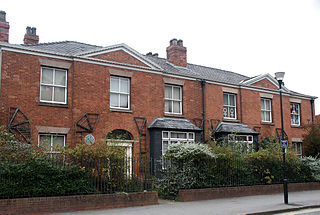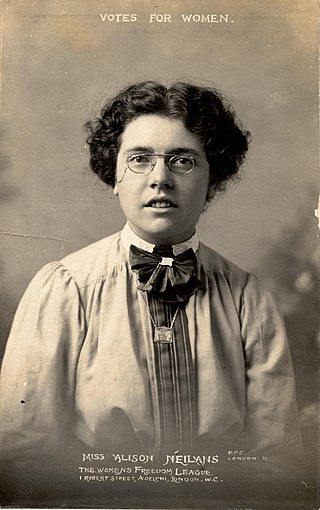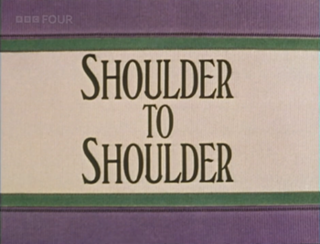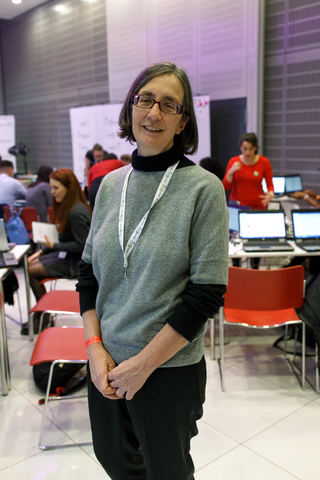
Emmeline Pankhurst was a British political activist who organised the British suffragette movement and helped women to win in 1918 the right to vote in Great Britain and Ireland. In 1999, Time named her as one of the 100 Most Important People of the 20th Century, stating that "she shaped an idea of objects for our time" and "shook society into a new pattern from which there could be no going back". She was widely criticised for her militant tactics, and historians disagree about their effectiveness, but her work is recognised as a crucial element in achieving women's suffrage in the United Kingdom.

Estelle Sylvia Pankhurst was an English feminist and socialist activist and writer. Following encounters with women-led labour activism in the United States, she worked to organise working-class women in London's East End. This, together with her refusal in 1914 to enter into a wartime political truce with the government, caused her to break with the suffragette leadership of her mother and sister, Emmeline and Christabel Pankhurst. Pankhurst welcomed the Russian Revolution and consulted in Moscow with Lenin. But as an advocate of workers' control, she rejected the Leninist party line and criticised the Bolshevik regime.

Dame Christabel Harriette Pankhurst was a British suffragette born in Manchester, England. A co-founder of the Women's Social and Political Union (WSPU), she directed its militant actions from exile in France from 1912 to 1913. In 1914, she supported the war against Germany. After the war, she moved to the United States, where she worked as an evangelist for the Second Adventist movement.

The Women's Social and Political Union (WSPU) was a women-only political movement and leading militant organisation campaigning for women's suffrage in the United Kingdom founded in 1903. Known from 1906 as the suffragettes, its membership and policies were tightly controlled by Emmeline Pankhurst and her daughters Christabel and Sylvia. Sylvia was eventually expelled.

Bow is a district in East London, England and is in the London Borough of Tower Hamlets. It is an inner-city suburb located 4.6 miles (7.4 km) east of Charing Cross.

The Pankhurst Centre, 60–62 Nelson Street, Manchester, England, is a pair of Victorian villas, of which No. 62 was the home of Emmeline Pankhurst and her daughters Sylvia, Christabel and Adela and the birthplace of the suffragette movement in 1903.

Adela Constantia Mary Walsh was a British-born suffragette who worked as a political organiser for the Women's Social and Political Union (WSPU) in Scotland. In 1914 she moved to Australia where she continued her activism and was co-founder of both the Communist Party of Australia and the Australia First Movement.

Black Friday was a suffragette demonstration in London on 18 November 1910, in which 300 women marched to the Houses of Parliament as part of their campaign to secure voting rights for women. The day earned its name from the violence meted out to protesters, some of it sexual, by the Metropolitan Police and male bystanders.

A movement to fight for women's right to vote in the United Kingdom finally succeeded through acts of Parliament in 1918 and 1928. It became a national movement in the Victorian era. Women were not explicitly banned from voting in Great Britain until the Reform Act 1832 and the Municipal Corporations Act 1835. In 1872 the fight for women's suffrage became a national movement with the formation of the National Society for Women's Suffrage and later the more influential National Union of Women's Suffrage Societies (NUWSS). As well as in England, women's suffrage movements in Wales, Scotland and other parts of the United Kingdom gained momentum. The movements shifted sentiments in favour of woman suffrage by 1906. It was at this point that the militant campaign began with the formation of the Women's Social and Political Union (WSPU).

Mary Eleanor Gawthorpe was an English suffragette, socialist, trade unionist and editor. She was described by Rebecca West as "a merry militant saint".

A suffragette was a member of an activist women's organisation in the early 20th century who, under the banner "Votes for Women", fought for the right to vote in public elections in the United Kingdom. The term refers in particular to members of the British Women's Social and Political Union (WSPU), a women-only movement founded in 1903 by Emmeline Pankhurst, which engaged in direct action and civil disobedience. In 1906, a reporter writing in the Daily Mail coined the term suffragette for the WSPU, derived from suffragistα, in order to belittle the women advocating women's suffrage. The militants embraced the new name, even adopting it for use as the title of the newspaper published by the WSPU.

Pont y Werin is a pedestrian and cyclist bridge spanning the River Ely between Cardiff Bay and Penarth, Wales.

Alison Roberta Noble Neilans was an English suffragette. Neilans was a member of the executive committee of the Women's Freedom League, a member of the Church League for Women's Suffrage and the East London Federation of Suffragettes, where she worked with Sylvia Pankhurst. She was also a member of the board of the International Woman Suffrage Alliance.

Shoulder to Shoulder is a 1974 BBC television serial relating the history of the women's suffrage movement, created by script editor Midge Mackenzie, producer Verity Lambert and actor Georgia Brown. It was broadcast on BBC2 between 3 April and 8 May 1974.

The Anti–Air War Memorial is located in Woodford Green, London, England. It was commissioned and erected by the socialist suffragist Sylvia Pankhurst in 1935 as "a protest against war in the air". It is Britain's first anti-war memorial, and is recorded in the National Heritage List for England as a Grade II listed building.

Helen Pankhurst is a British women's rights activist, scholar and writer. She is currently CARE International's senior advisor working in the UK and Ethiopia. She is the great-granddaughter of Emmeline Pankhurst and granddaughter of Sylvia Pankhurst, who were both leaders in the suffragette movement. In 2018 Pankhurst convened the Centenary Action Group, a cross-party coalition of over 100 activists, politicians and women's rights organisations campaigning to end barriers to women's political participation.

Jessica "Jessie" Kenney (1887–1985) was an English suffragette who was jailed for assaulting the Prime Minister and Home Secretary in a protest to gain suffrage for women in the UK. Details of a bombing campaign to support their cause were discovered by the authorities in her flat when Kenney was sent abroad to convalesce. She later trained as a wireless operator but worked as a stewardess.

Maud Joachim was a member of the Women's Social and Political Union, one of the groups of suffragettes that fought for women to get the right to vote in the United Kingdom. She was jailed several times for her protests. Joachim was one of the first suffragettes to go on hunger strike when imprisoned, a protest at not being recognised as political prisoners.

The statue of Millicent Fawcett in Parliament Square, London, honours the British suffragist leader and social campaigner Dame Millicent Fawcett. It was made in 2018 by Gillian Wearing. Following a campaign and petition by the activist Caroline Criado Perez, the statue's creation was endorsed by both the Prime Minister of the United Kingdom, Theresa May, and the Mayor of London, Sadiq Khan. The statue, Parliament Square's first monument to a woman and also its first sculpture by a woman, was funded through the government's Centenary Fund, which marks 100 years since some women won the right to vote. The memorial was unveiled on 24 April 2018.

Edith Hudson was a British nurse and suffragette. She was an active member of the Edinburgh branch of the Women's Social and Political Union (WSPU) and was arrested several times for her part in their protests in Scotland and London. She engaged in hunger strikes while in prison and was forcibly fed. She was released after the last of these strikes under the so-called Cat and Mouse Act. Hudson was awarded a Hunger Strike Medal 'for Valour' by the WSPU.




















